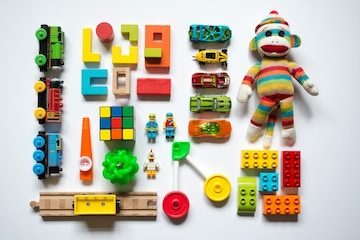How Toy Makers can Avoid Greenwashing Claims
In a cluttered market like the toy industry, a transparent approach goes a long way to stand out from competitors. Consumers will be more likely to trust your toys if the “eco-friendly” claims in your packaging and marketing materials are validated. Getting a Nordic Swan Ecolabel or USDA Certified Biobased Product label can help prove that your toy products are indeed “green”.
Nordic Swan Ecolabel for Toys with Biobased Textile Components

The Nordic Swan Ecolabel is the official ecolabel of the Scandinavian countries. Established in 1989, the Nordic Swan Ecolabel currently addresses more than 25,000 different products across 55 product groups, including toys.
All components of Nordic Swan Ecolabelled toys must meet stringent standards for environmental and health impacts. Each material in the product must be free from an extensive list of harmful chemical additives. The certification also has stringent requirements concerning the origins of raw materials used in biobased fibers and polymers, including crop type, chain of custody (CoC) certification, and documentation that the crops were not genetically modified. All toys which receive the Nordic Swan Ecolabel are in compliance with the EU Toy Safety Directive.
A Nordic Swan Ecolabelled toy must also meet additional criteria based on the material type.
For example, if the toy contains synthetic fibers of biobased origin (and textile constitutes more than 30% by weight of the product), the vegetable raw materials should be residual products or are not genetically modified. Synthetic fibers that contain biobased polymers sourced from raw materials such as sugarcane or maize must contain at least 90% biobased material reported in accordance with ISO 16620, ASTM D6866, or an equivalent standard.
The Nordic Swan Ecolabel is only applicable to toys marketed for children under the age of 14 that are made of one or more of these materials: (1) plastic, foam, silicone and rubber; (2) textiles, hide/skins and leather; (3) filler materials, (4) metal, (5) paper, paperboard and cardboard; (6) solid wood and bamboo; and (7) wood-based panels.
Examples of toys that can be Nordic Swan Ecolabelled are:
- Rattles, teething toys and activity toys made of various materials for children under the age of 3;
- Building blocks, dolls, soft toys, puzzles, spades, cars, doll’s houses and train sets;
- Ride-on cars and balance bikes for children IF they are covered by the EU Toy Safety Directive.
The following toys are NOT accepted:
- Electronic toys (including toys that contain batteries);
- Single-use toys, e.g. stickers;
- Balloons, water balloons, chemistry sets, slime toys, soap bubbles, other toys containing liquids (including encapsulated liquids);
- Toys attached to / included in food;
- Hobby supplies, e.g. modeling wax, fingerpaints, clay, plaster;
- Babies’ soothers;
- Fireworks;
- Sports equipment and bicycles designed for sport or for use on public roads.
The latest Nordic Swan Ecolabel Criteria for Toys (version 3.6) is valid until June 30, 2026.
USDA Certified Biobased Label for Toys and Sporting Gear
Created by the Farm Security and Rural Investment Act of 2002 and expanded by the Agriculture Improvement Act of 2018, the U.S. Department of Agriculture’s BioPreferred® Program aims to increase consumption of biobased products in the country. The Program provides federal agencies with tools and training to help them meet their biobased purchasing requirements and aid consumers to easily identify commercially available biobased products. As of May 2023, the Program has identified 139 product categories for which agencies and their contractors have purchasing requirements.
For toys and sporting gear, the USDA BioPreferred Program will only accept products that are at least 32% biobased as measured by ASTM D6866 testing as of May 2023. Certification remains valid only if the certified toy or sporting gear complies with the required minimum biobased content. If the USDA revises the required minimum levels, the certified product must meet the new requirement to continue using the label.
To maintain credibility, the USDA BioPreferred Program routinely audits the products it qualifies.
The Program describes the toys and sporting gear category as “products that are designed for indoor or outdoor recreational use including, but not limited to, toys; games; and sports equipment and accessories such as balls, bats, racquets, nets, and bicycle seats.” Excluded from this category are cleaners, lubricants, and oils that are used to maintain or clean toys and sporting gear.
About Beta Analytic
ISO/IEC 17025:2017-accredited Beta Analytic provides high-quality ASTM D6866 biobased content testing. Based in Miami, Florida, the laboratory has forwarding offices in London, UK; Madrid, Spain; Xiamen, China; Nagoya, Japan; Seoul, South Korea; and Taipei, Taiwan. All packages shipped to these offices are forwarded to Miami via overnight courier service at Beta Analytic’s expense.

Beta Analytic is not affiliated with the Nordic Swan Ecolabel or the USDA BioPreferred Program. However, you are welcome to contact us if you have any questions on testing fees and sample size recommendations.
Join our mailing list to receive news of upcoming webinars by Beta and its subsidiaries as well as other industry updates.
Ready to Submit Toy Samples?
Please contact us before sending your toy samples. We will need instructions on which component to analyze, especially for products with multi-color parts. Please also let us know if you intend to test the biobased content of your product’s packaging materials.
References:
- Nordic Swan Ecolabel for Toys
- USDA – What is the BioPreferred Program?
- USDA BioPreferred Program Product Categories (accessed May 2023)
You may also be interested in these topics:
USDA Certified Biobased Application – BioPreferred Program
Why Measure your Product’s Biobased Content?
Photo by Vanessa Bucceri on Unsplash
This entry was posted on Wednesday, June 7th, 2023 and is filed under Biobased Products, USDA Biopreferred Program .